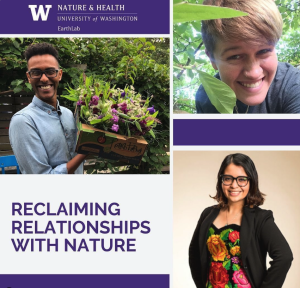Reclaiming Relationships with Nature
 Institutional racism remains present in Black and Indigenous communities—especially with COVID-19 and the recent murders of our Black relatives. During this June 2020 talk, Nat, Jessica, and Jules came together to discuss how our intersectional identities weave experiences in relationships with nature.
Institutional racism remains present in Black and Indigenous communities—especially with COVID-19 and the recent murders of our Black relatives. During this June 2020 talk, Nat, Jessica, and Jules came together to discuss how our intersectional identities weave experiences in relationships with nature.
Guest Speakers
Nat Mengist (he/him) is a proud child of Ethiopian immigrants. As a research assistant at the University of Washington, Bothell campus, he manages data for Learning in Places, an NSF-funded study that co-designs equitable science education in outdoor learning environments. Nat is also a farm coordinator for The Common Acre, where he served as a board member for nearly two years. Trained in Comparative History of Ideas and Education Policy at UW, he has been presenting research on plants, alchemy, and injustice at academic conferences since the 2017 Annual Meeting of the Society for Literature, Science, and the Arts, and has been facilitating workshops and trainings around racial equity for nonprofits and undergraduates since 2018.
Jessica Hernandez (Zapotec & Ch’orti’ Maya) (she/hers) is an Indigenous scientist and scholar. She is obtaining her PhD from the School of Environmental and Forest Sciences this Summer 2020. Her dissertation, Indigenous Lands Before Urban Parks: Indigenizing Restoration in Discovery Park, aims to bring attention to climate and food justice as a means of environmental justice in urban settings-focusing on land. She is also exploring and examining the urban Native diaspora of Seattle and finding ways in which Indigenous knowledge systems and contemporary diets have adapted to their new urban setting. She is the founder of Piña Soul, SPC—an environmental consulting & artesanias hybrid business that promotes and supports environmental sustainability & conservation among Black & Indigenous communities. Her book, Fresh Banana Leaves: Healing Indigenous Landscapes through Indigenous Science, is forthcoming this Fall ’21.
Jules Hepp (they/them) is a queer nonbinany person, environmental educator, and artist. They have been teaching, leading, and facilitating nature connection learning for people of many different ages and backgrounds for over 10 years. They are passionate about teaching and education outdoors, and utilizing place-based and critical pedagogies to inform how we are able to learn and transform their learning to their lives, communities, and society. They believe firmly that environmental education needs to use an anti-racist and social justice lens to teach and explore the conceptual constructs of place and how a place is defined within social, cultural, and political values and ideas.
Share Ideas for Future Speakers
If you’d like to present at an upcoming session or if you have an idea for a speaker, please email us at natureandhealth@uw.edu.
Learn About Upcoming Events
Check out our calendar of events and connect with us on Facebook and Instagram to learn about upcoming talks.